Deborah J. Ross's Blog, page 53
March 18, 2020
Today's Moment of Irises
Published on March 18, 2020 14:41
March 16, 2020
Newsletter: Some News, Some Hope, Some Kitten Pictures...
 Some news, some hope, some kitten pictures...Let's face it, the national news has been anything but inspiring. Nevertheless, we shall persist in supporting one another, our families and communities, and in writing -- and reading! -- great books.First, the writing news:
Some news, some hope, some kitten pictures...Let's face it, the national news has been anything but inspiring. Nevertheless, we shall persist in supporting one another, our families and communities, and in writing -- and reading! -- great books.First, the writing news:DAW, my publisher, plans to release The Laran Gambit in 2021. Stay tuned!
My agent has sold the audiobook rights for all my Darkover books (including The Laran Gambit ) to Recorded Books. I'll let you know when there are more details.
I've resigned from Book View Café and my books are no longer available there. If you have previously purchased one and need to download it again, you should be able to do so, but if you run into any problems, let me know and I'll make sure you get it.
I plan on offering special sale prices at other venues from time to time, and of course my annual winter giveaways. Meanwhile, almost all of my books are available through Overdrive at your public library. Enjoy!Now, an illustrated Journey of (Red) Sonja the Kitten
 Here is Sonja in fall 2018, about a month old. She's just been picked up by the shelter. Poor thing is covered in ringworm, half-starved, and terrified. They were going to euthanize her the same day, but a worker realized she was a Maine Coon and called a private shelter that specializes in that breed...
Here is Sonja in fall 2018, about a month old. She's just been picked up by the shelter. Poor thing is covered in ringworm, half-starved, and terrified. They were going to euthanize her the same day, but a worker realized she was a Maine Coon and called a private shelter that specializes in that breed...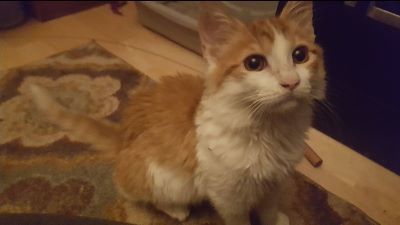 Here she is after being with us a few months. The ringworm is cleared up, but she still looks a bit dazed.
Here she is after being with us a few months. The ringworm is cleared up, but she still looks a bit dazed.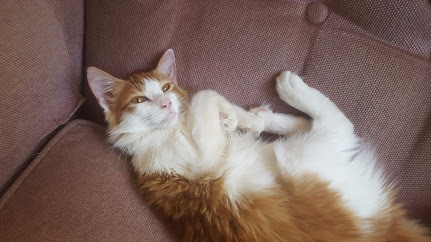 And here she is today, fully aware of how gorgeous she is, affectionate, playful, and bursting with personality.
And here she is today, fully aware of how gorgeous she is, affectionate, playful, and bursting with personality. Really, says Sonja.Copyright © 2020 Deborah J. Ross. All rights reserved.
Really, says Sonja.Copyright © 2020 Deborah J. Ross. All rights reserved.Our mailing address is:
P.O. Box 1412
Boulder Creek CA 95006
Want to change how you receive these emails?
You can update your preferences or unsubscribe from this list.


Published on March 16, 2020 01:00
March 13, 2020
Short Book Reviews: Escape from the Brothel (with Unbelievable Horses)
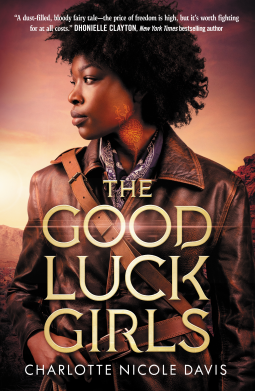 The Good Luck Girls, by Charlotte Nicole Davis (Tor Teen)
The Good Luck Girls, by Charlotte Nicole Davis (Tor Teen)I gave up on this book about a quarter through. The opening really grabbed me – the dystopic world with its resonance of the Wild West, “dustblood” girls raised in a brothel, drugged so they would not resist their boorish “brags,” the autocratic madam, the girls being tattooed with magic symbols that not only identify them but flare into agony when covered up. And sweet, trusting Clementine, about to entertain her first customer. When she resists being raped, she accidentally kills him (and although she does not know it, he is the son of a very powerful, wealthy family who will be bent on revenge). Her sister, Aster, concocts an escape attempt as the alternative to execution. These are young teenagers, so of course their planning is haphazard, but they manage to get away, aided by the madam’s favorite and a pair of other girls. I was with them, entranced, every step of the way.
That, alas, was where I ran into obstacles. If I trust a writer, I can immerse myself in the story, accepting details I do not necessarily understand as part of the world. After all, our own world isn’t always explicable or consistent. But when I’m jarred out of the narrative by a detail I know isn’t right, it can be hard to resume the flow. That happened when the girls had stolen some horses and were about to flee. The author had them cracking the reins to signal the horses to move forward. Anyone who’s spent any time with horses knows this is nonsense. All it accomplishes is futile arm-waving and an annoyed horse. There followed, in close succession, equally implausible details – horses having black eyes (they don’t), galloping through the night (a sure way to kill a horse), and stabbing a mountain lion between the shoulders (please check an anatomy chart for why this is not an effective strategy). By this time, I was questioning everything in the narrative. The writer had lost my confidence.
To make matters worse, I found the escape chapters emotionally flat after a gripping, excitement-laden beginning. Instead of having an emotional shape, this section felt as if the author had strung together one danger after another without a clear direction. The girls were headed to a possibly imaginary person, far away, who might be able to remove their tattoos, yet this wasn’t established in my mind as a pressing need.
In contrast, there was a well-executed dramatic sequence in which one of the girls (the madam’s favorite, Violet) goes into withdrawal from the sedating drug, Sweet Thistle, and two of the girls venture into a town to find a supply of it. They had to cover their tattoos and suffered increasing discomfort, but I didn’t come away believing that the tattoos were a critical threat to them. So the journey becomes just one unconnected episode after another toward a dubiously necessary goal. At least, that was my experience when I set the book down.
To its credit, this story centers on teen girls in a dangerous world, who are at first powerless but discover their own resourcefulness and overcome their initial antagonisms to work together. Those are worthy themes. I applaud the author for portraying young women with agency. I hope that other readers will not have the same difficulties I did and will immerse themselves in this story.

Published on March 13, 2020 01:00
March 11, 2020
Today's Moment of Art
Published on March 11, 2020 01:00
March 6, 2020
Short Book Reviews: Hunting the Last Sea Dragon
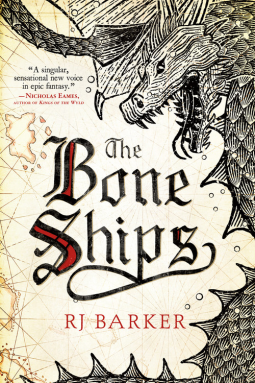 The Bone Ships, by RJ Barker (Orbit Books)
The Bone Ships, by RJ Barker (Orbit Books)Oh, what a luscious, heart-rending, beautifully crafted book this is! In the world of warring island nations, the most valuable commodity – one that comprises the great war ships that grant naval supremacy – is the bones of sea dragons. The supply is limited, for the dragons are believed to be extinct, so the bones are salvaged and repurposed to for the great ships of the fleet. Then there are the black ships, the ships of the condemned and untouchable. Fisherman’s son Joron is one of those wretched souls, sentenced as “shipwife” (captain) to a black ship and determined to stay as drunk as possible. His fortunes change with the arrival of “Lucky” Meas, an extraordinary leader and daughter of the ruler, although why she might have been sentenced to a black ship, Joron has no idea. As Meas trains and then inspires the dissolute crew, Joron goes from grudging obedience to trust, even as he learns her true mission. For after centuries a sea dragon has been spotted, and the contest for its precious bones threatens to plunge the world into unending war.
There is so much to love about this book, but for me it was the language that enchanted me the most. I found myself slowing down and repeating passages just to savor them. In many senses, the narrative text itself was a character and gateway to this world.
Tide Child’s colour showed he [in this world ships are masculine] was a last-chance ship, the crew condemned to death. The only chance anyone had for a return to life was through some heroic act, something so undeniably great that the acclaim of the people would see their crimes expunged and their life restored to them. Such hope made desperate deckchilder, and desperate deckchilder were fierce. Though if any forgiveness had been offered to the dead it had not been in Joron’s lifetime, or in his father’s lifetime before him.
At some point this crew of the violent and the lost had decided that Meas could be trusted, and if she kept her side of the bargain then they would keep theirs. It was an odd thing, thought Joron, to find a purpose in such a dark place as a black ship.
Superb world-building, compelling characters, and carefully nuanced tension mark Bone Ships as a book to treasure. And there will be more – I can hardly wait!

Published on March 06, 2020 01:00
March 4, 2020
Today's Moment of Art
Published on March 04, 2020 01:00
March 2, 2020
About That Review...
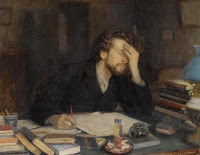 Unless you write in secret and never show anyone your stories, sooner or later someone will give you feedback. It could be a relative or classmate, or the editor of the school literary magazine. Or friend with whom you’ve swapped fanfic. What you want to hear, of course, is that they loved it. And chances are that’s what they’ll say, either because they’d love anything you wrote or they’re so impressed that anyone they know wrote anything, or they have no idea how to evaluate a piece of writing. If your friends are still in high school, they might have a passing acquaintance with writing book reports, but that’s not helpful in critiquing a manuscript.
Unless you write in secret and never show anyone your stories, sooner or later someone will give you feedback. It could be a relative or classmate, or the editor of the school literary magazine. Or friend with whom you’ve swapped fanfic. What you want to hear, of course, is that they loved it. And chances are that’s what they’ll say, either because they’d love anything you wrote or they’re so impressed that anyone they know wrote anything, or they have no idea how to evaluate a piece of writing. If your friends are still in high school, they might have a passing acquaintance with writing book reports, but that’s not helpful in critiquing a manuscript.I think this stage in the development of writers, readers, and reviewers is just fine. We all start out with boundless enthusiasm and undeveloped critical ability. When a writer is just starting out, praise and encouragement are a whole lot more helpful than disapproval. Case in point: the story of the Wranglers and the Stranglers (attributed to Arthur Gordon in A Touch of Wonder). Various versions run something like this:
A group of male college students with literary talent formed a club. They met regularly to read and critique each other's work. These men were merciless with one another. They dissected the most minute literary expression into a hundred pieces. They were heartless, tough, even mean, in their criticism. They were so relentless in their criticism that their group became known as “The Stranglers.”
Not to be outdone, the women of literary talent in the university were determined to start a club of their own, one comparable to the Stranglers. They called themselves the "Wranglers." They, too, read their works to one another. But there was one great difference: the feedback was positive. Sometimes there was almost no criticism at all. Every effort, even the most feeble one, was encouraged.
Twenty years later of all the bright young men in the Stranglers, not one had made a significant literary accomplishment of any kind. From the Wranglers had come six or more successful writers, some of national renown such as Marjorie Kinnan Rawlings, who wrote The Yearling.
Talent between the two? Probably the same. Level of education? Not much difference. But the Stranglers strangled, while the Wranglers were determined to give each other a lift. The Stranglers promoted an atmosphere of contention and self-doubt. The Wranglers highlighted the best, not the worst.
That’s what we need to get started: kindness and encouragement. Eventually, however, most of us encounter situations in which we benefit from critical feedback in order to overcome our own creative blind spots. And once we’ve started publishing, whether with a traditional publisher or self-publishing, we enter a new realm: our work being reviewed.
A review is not a book report, nor is it a manuscript critique. It could include formal literary analysis of the academic sort, or it could be more casual and personalized to the reviewer. It could appear in a small home town newspaper, a literary journal, a genre magazine like Locus, or online, either in the reviewer’s blog, GoodReads, LibraryThing, or a book-selling site. Chances are the reviewer will be a stranger, someone who knows of you only through the words on the page.
Some writers – a small fraction, I suspect – possess the self-discipline to avoid reviews. Most of us can’t resist. We want to know how much the reviewer praised our literary offspring. It’s wonderful when we get a thoroughly positive review, but devastating when a reviewer says caustic, negative things. It’s even worse when it’s clear the reviewer has either not understood what the text said or obviously never read it. (This happened to me with a book that had not yet been released, and only the editor and I had copies of the file.) Reviewers can also have personal agendas in eviscerating a book. I call these “revenge reviews.”
What is an author to do in the face of a negative review?
First, find a safe place to let your feelings settle. Don’t pretend it didn’t hurt when it did. The goal is let go of that upset so that you can move forward with the next project, but most of us need a moment or twelve to allow the adrenalin to drain away and to regain our composure. Sympathetic fellow writers can help, but not ones who tell you to get over it before you actually are over it. Let’s face it: having our precious literary offspring shredded hurts.
Second, decide whether there might be something of value to you in the review. You can’t do this while you’re upset, but you might be able to do it once you’re calm. The reviewer might have an axe to grind, but they also might see things you missed. Remember, you view the story through the lens of your intention, your dream for the story, but the reviewer sees only the words on the page. They might catch places where, even with the best editing in the world, the words fall short in capturing the story that played out between your ears. You might conclude, after consideration, that the reviewer was either careless or biased or just didn’t get what you were doing. It’s fine if you never way to read that negative review again. But it should be a conscious decision.
What shouldn’t you do?
Respond, either publicly or privately. Just. Don’t. Do. It.
No matter how hard you want to give that #$%^&* reviewer a piece of your mind, refrain. Even if there’s a crucial piece of information they missed, refrain. Even if they gave the book a terrible review because the book-seller shipped it a day late, refrain. Even if It’s Just Not Fair What They Said, refrain.
Writers often become reviewers (although not all reviewers are writers). I’m among them. I try to review all the ARCs I receive, and I also review for NetGalley. Not too long ago, I reviewed a book by an author unfamiliar to me. In my typical style, I began with how much I loved the premise and how well certain elements were handled. But I encountered problems having to do with larger issues, in this case, the moral and ethical implications of certain aspects of the story. I ended by saying that other readers might feel differently. I appreciate it, though, when a review sparks a discussion of issues, cultural or political or, in this case, ethical. As usual, I linked to my blog review on various social media sites and, also as usual, I tagged the author’s name and book title. The author was Not Amused and shot back a complaint that I had posted a “mediocre review” and how offensive it was to tag them with multiple posts.
So what should a reviewer do?
Much the same thing as a writer. Refrain from public response.
However, it seemed to me that this was an opening for discussing reviews from the reviewer’s as well as the author’s perspective. I waited, then scrubbed off anything like an identifier, and posted:
Note to authors: when someone posts a thoughtful, mixed review, it is not professional behavior to whine publicly to the reviewer. A "mediocre review" may in fact be just the thing that gets a reader to pick up the book and become a devoted fan.As I’d hoped, this led to a discussion on several social media sites about reviews. Perhaps I erred in being too specific in quoting the phrase, “mediocre review.” As far as I know, no one connected my post with the original complaint. That does not justify what may have been overstepping the “Do Not Respond” rule. Unprofessional public behavior on the part of the author being reviewed does not justify unprofessional behavior on the part of the reviewer. We’re all a work in progress.
Various sequelae: I will be reviewing the author’s next book. The author took down the complaints on social media. Much good discussion engaged a number of readers. This post arose from those conversations, and will, I hope, furnish food for continued thought about our public discourse on literature.

Published on March 02, 2020 01:00
February 28, 2020
Short Book Reviews: The Princess and the Grave-Robber
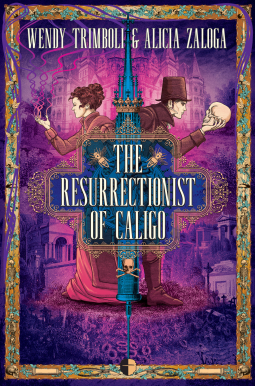 The Resurrectionist of Caligo, by Wendy Trimboli and Alicia Zaloga (Angry Robot)
The Resurrectionist of Caligo, by Wendy Trimboli and Alicia Zaloga (Angry Robot)In this fantastical version of Victorian England, magic runs in the royal family, which jealously guards the purity of its bloodline. One of the elite is young Princess Sibella, currently in disgrace at a remote, austere country estate. Her magical abilities include an inner glow and streaming ink from her fingers to create not only letters on paper but tapestries in the air. Her childhood companion, Roger, has also been expelled in disgrace and now ekes out a living as a “resurrectionist,” procuring bodies for anatomical study at Caligo’s medical school while learning everything he can about surgery. Their parting was rife with misunderstanding, hurt, and anger.
Now danger stalks the back streets of Caligo as “The Greyanchor Strangler” strikes again, just as Sibella is summoned back home to be a marriage pawn in trade negotiations with a neighboring kingdom. Eventually, of course, their paths cross again, Roger is accused of being The Strangler, Sibella navigates the tortuous schemes of the royal court, and secret plots and parentages are revealed. It’s as much a comedy of manners and switched identities as a love story, a murder mystery, and a tale of international intrigue as it is a fantasy. The characters are fresh and lively, the plot twists many and delightful, and a delicious vein of humor, while not taking itself too seriously, runs through the whole story. Verdict: an entertaining read, quirky world-building, and fun characters mark this as hopefully the beginning of wonderful series.

Published on February 28, 2020 01:00
February 26, 2020
Today's Moment of Art
Published on February 26, 2020 01:00
February 24, 2020
Auntie Deborah Advises on the Business of Writing
Auntie Deborah is back at her advice desk…
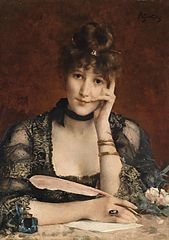
If two authors want to collaborate on writing a novel, how much should each author contribute?Auntie Deborah: It all depends. There are so many different ways to do this. I’ve seen authors alternate chapters, divide scenes according to their strengths (ex: character/dialog vs action/technology), one writes the draft and the other revises it. I co-wrote a (published) short story in which my partner described a scene while I typed it out, asking questions and filling in details.For the last 20 years, I’ve written posthumous collaborations with the author who was my mentor. During the last year of her life, we talked about the basic plot arc for the first 3 books, but then she died and I wrote those books (and 6 more and counting…) My natural literary “voice” is very close to hers so the transition was easy. Her Literary Trust approves the manuscript for consistency of style and content before it goes to her agent (who also happens to be my agent), so in a sense they act as a current collaborator. I work under subcontract to them and we have a formal, written, legal agreement.The one unbreakable rule is that you set down in writing how you will resolve differences, divide payment, and what you will do if it all falls apart. Absolutely do not skip this step!
Is it wise to try and find a literary agent before I've finished writing my novel? Auntie Deborah: I would advise not. First and foremost, the agent has to have something to sell. Otherwise there’s no point in representing an author without a marketable project. Second, you will be new to the agent and she will have no idea whether you can take those unfinished pages and turn them into something great. On the other hand, suppose they liked the sample chapters but you don’t have the rest ready to submit; you’ll end up either losing that interest in delay or sending something not ready. Either way you’ll have lost a potential agent.If you’ve made personal contact with an agent, say at a convention, pitched your project, and aroused their interest, follow that with a polite note. Do not send anything less than your polished best! You don’t want to get put into the “talks great but doesn’t deliver” category. Then when you do submit, use the cover letter or query — depending on what the agent has asked for — to remind them of past interest.Be patient. Do your work to the utmost of your ability. How do literary agents get paid? What do authors pay for in traditional publishing? What are the responsibilities?Auntie Deborah: Reputable literary agents work on commission, (usually 15% for US). They represent you in negotiations, often obtaining advances and rights (like foreign reprints) far beyond that 15%. I’m such a terrible negotiator, I think my agent is worth every penny many times over. Because they are your agents, the payment comes to them, they deduct their commission, and the rest goes to you. So there’s no out of pocket expense. No sale, no commission.Notice I said reputable. There are always scam agents out there who will charge an up-front reading fee. This is not considered an ethical practice, and no serious author should agree to such terms. (I should add that 30 or 40 years, a major agency used to do this, but their success rate in then placing the books was good, they’ve been out of business for a long time, and no reputable agency today does this.) Check out any possible agent on Preditors and Editors or SFWA’s Writer Beware sites.There should be no out-of-pocket expenses for you. However, many authors do their own promotion in addition to what the publisher does. How much and even if you do this is entirely up to you. I’ll often set up a few signings with local bookstores and give a talk at my branch library. I blog, have a website, Facebook author page, and Tweet about new releases. None of this costs me directly (only gas and electricity and internet access).Your responsibilities are spelled out in the contract with your publisher (and also with your agent). They usually include deadlines — when you will turn in the edited or proofread manuscript, and such like. Most editors will cut you slack if an emergency arises so long as you tell them what’s going on!
Can a publishing company purchase the complete rights to a manuscript?Auntie Deborah: It can try, but any author who signs away all rights is an idiot.
Why don't publishers allow the desperately poor to pirate their books?Auntie Deborah: I think you’re really asking, “How can I read the books I want for free, since I can’t afford to buy them, without ripping off authors?”And there are actually some good answers to that question.Borrow the books from your public library! If the book is new and not in the catalog, ask your librarian to order it. That way, you (and others) get to read it free, and the author gets paid. Many libraries permit borrowing of ebooks through OverDrive, so you can read them on your Kindle.Become a book reviewer. You can review books on your online blog, local newspaper, or sites like GoodReads, LibraryThing, or vendors like Amazon or Barnes and Noble. Begin with books you love, then when you have established yourself, contact the author and/or publisher and request ARCs or review copies of the forthcoming or newly released books you want. Authors and publishers depend on reviewers to get the word out. But make sure you can supply links to your reviews. Learn how to write a good review.Sign up for giveaways (check LibraryThing and Amazon, for example). Check for free specials at the online writers cooperative publisher, Book View Cafe or Bookbub.If all else fails, write to the author (most have a contact button on their websites or blogs) and ask directly. Be polite, don’t be greedy, and explain your circumstances. Ask for a specific title (not “whatever you can send”) and say why. I, like others, often have a few extra author’s copies to lend. I’m much more likely to send a free book if the reader is a genuine fan, not someone who’s just out for free books they will turn around and re-sell without reading.I should add that it’s not uncommon for pirated ebooks to come with malware or a ton of errors, in which case you got exactly what you paid for.

Published on February 24, 2020 01:00











